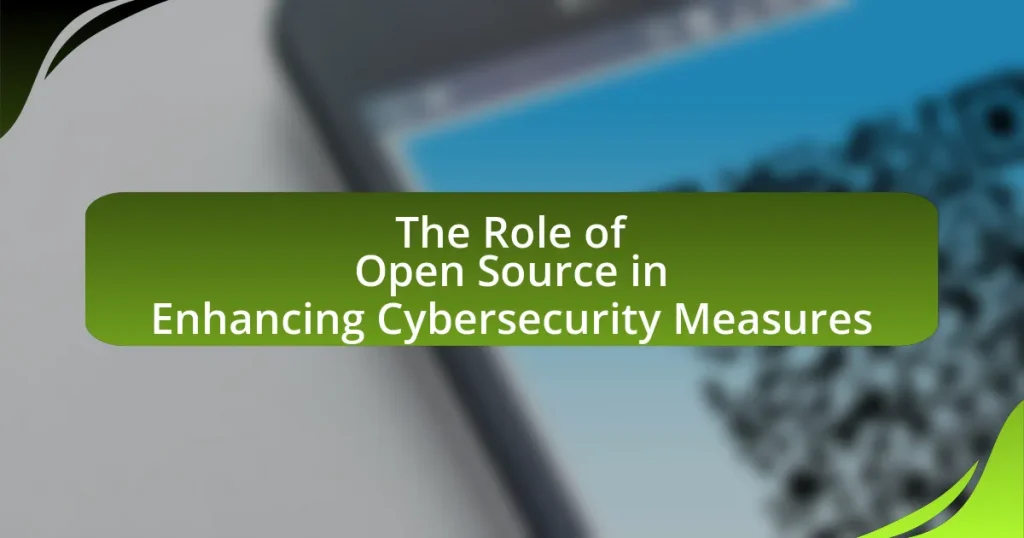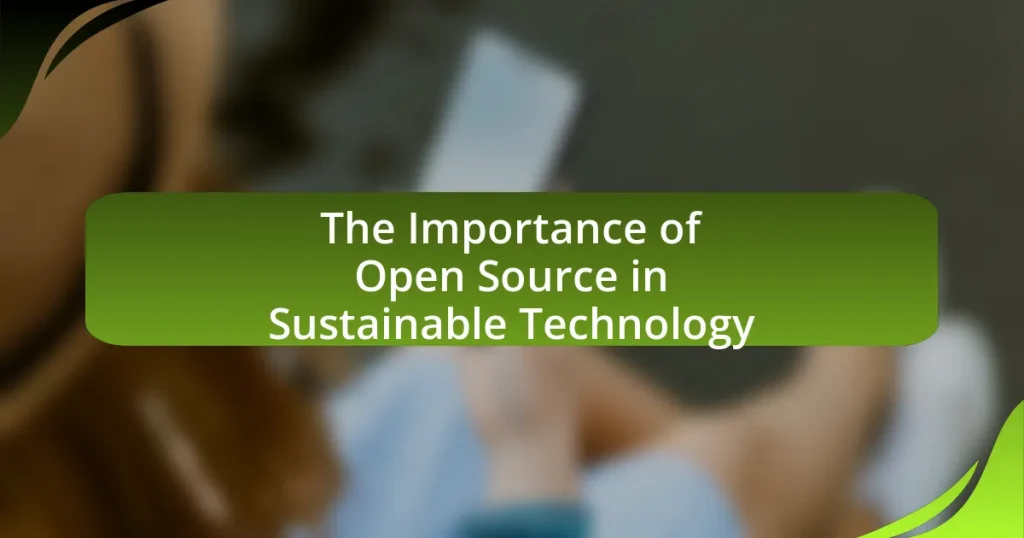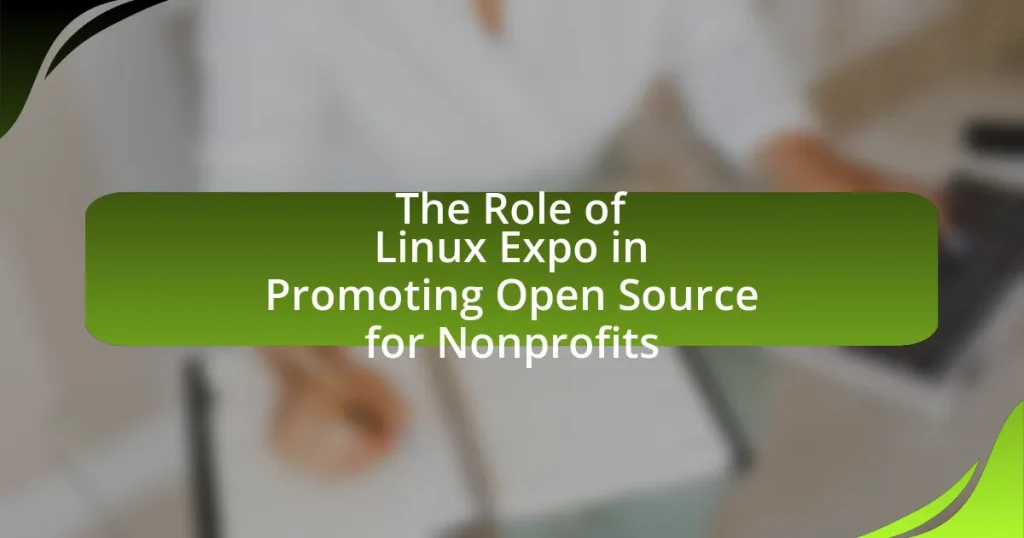The article examines current trends in open source contributions among developers, highlighting increased collaboration across diverse communities, a rise in contributions to documentation and testing, and a focus on sustainability. It discusses the evolving landscape of contributions, influenced by demographic factors and the popularity of platforms like GitHub and GitLab. Key areas of focus include the types of projects developers engage with, the programming languages used, and the personal and professional benefits gained from participation. Additionally, the article addresses challenges faced by new contributors and offers insights into how organizations can support open source involvement, ultimately predicting a significant increase in contributions driven by technological advancements and community engagement.

What are the current trends in open source contributions among developers?
Current trends in open source contributions among developers include an increase in collaboration across diverse communities, a rise in contributions to documentation and testing, and a growing focus on sustainability and funding for projects. Developers are increasingly participating in projects that emphasize inclusivity and accessibility, reflecting a broader commitment to social responsibility. According to the 2023 Open Source Survey by GitHub, 70% of developers reported contributing to open source projects, with a notable increase in contributions from underrepresented groups. This data highlights the evolving landscape of open source contributions, driven by community engagement and the need for diverse perspectives in software development.
How has the landscape of open source contributions evolved in recent years?
The landscape of open source contributions has evolved significantly in recent years, marked by increased participation from diverse demographics and the rise of collaborative platforms. Data from the 2021 GitHub Octoverse report indicates that the number of open source contributors grew by 23% from the previous year, highlighting a surge in community engagement. Additionally, the emergence of platforms like GitHub and GitLab has streamlined the contribution process, making it more accessible for developers of all skill levels. Furthermore, organizations are increasingly adopting open source practices, with 90% of companies in a 2022 survey by the Linux Foundation stating that they rely on open source software, which further drives contributions and collaboration.
What factors have influenced the increase in open source contributions?
The increase in open source contributions has been influenced by several key factors, including the rise of collaborative platforms, the growing demand for transparency in software development, and the increasing recognition of open source skills in the job market. Collaborative platforms like GitHub and GitLab have streamlined the contribution process, making it easier for developers to share and collaborate on projects. Additionally, the demand for transparency has led organizations to adopt open source solutions, fostering a culture of sharing and collaboration. Furthermore, as companies increasingly value open source experience, developers are motivated to contribute to enhance their employability and professional reputation. These factors collectively drive the growth of open source contributions in the developer community.
How do developer demographics affect contribution trends?
Developer demographics significantly affect contribution trends by influencing the diversity of perspectives, skills, and experiences brought to open source projects. For instance, research indicates that projects with diverse contributors tend to produce higher quality code and foster more innovative solutions, as seen in studies by the GitHub Octoverse report, which highlights that teams with varied backgrounds are more likely to address a broader range of user needs. Additionally, demographic factors such as age, gender, and geographic location can impact the availability of contributors and their engagement levels, with younger developers often being more active in online communities, while underrepresented groups may face barriers that limit their participation. This demographic influence shapes the overall health and sustainability of open source ecosystems, as diverse contributions lead to richer collaboration and problem-solving capabilities.
What are the most popular platforms for open source contributions?
The most popular platforms for open source contributions are GitHub, GitLab, and Bitbucket. GitHub leads the market with over 73 million developers and hosts millions of repositories, making it the primary choice for collaboration and version control in open source projects. GitLab offers integrated CI/CD features and a strong focus on DevOps, attracting a significant user base. Bitbucket, owned by Atlassian, integrates well with other Atlassian products and is favored for its support of both Git and Mercurial repositories. These platforms collectively facilitate a vast majority of open source contributions globally, as evidenced by their user statistics and repository counts.
Which platforms are leading in terms of developer engagement?
GitHub and Stack Overflow are leading platforms in terms of developer engagement. GitHub, with over 83 million developers, facilitates collaboration through repositories and pull requests, making it a central hub for open source contributions. Stack Overflow, hosting over 50 million questions and answers, fosters community interaction and knowledge sharing, which significantly enhances developer engagement. Both platforms have established themselves as essential resources for developers, evidenced by their large user bases and active participation rates.
How do these platforms facilitate contributions?
These platforms facilitate contributions by providing accessible tools and environments for developers to collaborate on projects. For instance, platforms like GitHub and GitLab offer version control systems, issue tracking, and pull request features that streamline the process of contributing code. According to the 2021 GitHub Octoverse report, over 60 million developers used GitHub, highlighting the platform’s role in fostering collaboration and contribution in open source projects. This accessibility encourages a diverse range of developers to participate, thereby enhancing the overall quality and innovation within the open source community.
What types of projects are developers contributing to?
Developers are contributing to a variety of projects, primarily in the realms of web development, mobile applications, data science, machine learning, and infrastructure tools. According to the 2023 GitHub Octoverse report, web development projects account for approximately 40% of contributions, while mobile applications and data science projects each represent around 15%. Additionally, machine learning and infrastructure tools are gaining traction, reflecting the growing demand for AI and cloud-based solutions. This data illustrates the diverse landscape of open source contributions, highlighting the significant areas where developers are actively engaged.
Which programming languages are most commonly used in open source projects?
The programming languages most commonly used in open source projects are JavaScript, Python, and Java. According to the 2021 Open Source Survey conducted by GitHub, JavaScript is the leading language, utilized in 94% of open source projects, followed by Python at 66% and Java at 54%. These statistics highlight the prevalence of these languages in the open source community, reflecting their versatility and widespread adoption among developers.
What are the emerging areas of focus in open source contributions?
Emerging areas of focus in open source contributions include artificial intelligence, machine learning, cloud computing, and blockchain technology. These domains are gaining traction as developers seek to leverage open source frameworks and tools to innovate and solve complex problems. For instance, the rise of AI and machine learning has led to significant contributions in libraries like TensorFlow and PyTorch, which are widely used for developing intelligent applications. Additionally, cloud computing platforms such as Kubernetes and OpenStack have seen increased collaboration, enabling scalable and efficient infrastructure management. The blockchain sector is also witnessing a surge in open source projects, with initiatives like Hyperledger and Ethereum fostering community-driven development. These trends reflect a shift towards collaborative innovation in cutting-edge technologies, as evidenced by the growing number of contributors and projects in these areas.
How do developers perceive the value of contributing to open source?
Developers perceive the value of contributing to open source as significant for personal and professional growth. This perception is supported by findings from the 2021 Open Source Survey, which indicated that 83% of developers believe contributing to open source enhances their skills and knowledge. Additionally, developers recognize that open source contributions can improve their visibility in the tech community, with 70% stating that it positively impacts their career opportunities. This dual benefit of skill enhancement and career advancement underscores the importance developers place on open source contributions.
What personal and professional benefits do developers gain from contributions?
Developers gain personal and professional benefits from contributions, including enhanced skills, increased visibility, and networking opportunities. By contributing to open source projects, developers improve their coding abilities and learn new technologies, as they often work with diverse codebases and collaborate with other skilled developers. This practical experience can lead to better job prospects, as employers value candidates with proven contributions to well-known projects. Additionally, contributions help developers build a professional network, connecting them with industry leaders and peers, which can lead to mentorship and job referrals. According to a 2021 GitHub survey, 90% of developers reported that contributing to open source improved their skills, while 70% noted that it helped them gain recognition in the tech community.
How does contributing to open source impact a developer’s career trajectory?
Contributing to open source significantly enhances a developer’s career trajectory by increasing visibility and credibility within the tech community. Developers who actively participate in open source projects can showcase their skills, collaborate with other professionals, and build a portfolio that demonstrates their expertise. According to a 2021 survey by GitHub, 90% of hiring managers consider open source contributions as a valuable asset when evaluating candidates. This involvement often leads to networking opportunities, job offers, and career advancements, as many companies actively seek developers with proven experience in collaborative coding environments.
What challenges do developers face when contributing to open source?
Developers face several challenges when contributing to open source, including a lack of clear documentation, difficulty in understanding the project’s codebase, and limited guidance from maintainers. These challenges can hinder effective contributions, as unclear documentation can lead to confusion about how to implement features or fix bugs. Additionally, complex codebases may require significant time to comprehend, which can discourage new contributors. Research indicates that 70% of developers cite inadequate documentation as a primary barrier to participation in open source projects, highlighting the need for improved resources to facilitate contributions.
What barriers exist for new contributors in the open source community?
New contributors in the open source community face several barriers, including a lack of clear onboarding processes, insufficient mentorship, and intimidating project complexity. These barriers hinder participation by making it difficult for newcomers to understand project requirements and workflows. Research indicates that 70% of new contributors report feeling overwhelmed by the technical skills required, while 60% cite a lack of guidance as a significant obstacle. Additionally, the culture of some projects can be unwelcoming, which discourages potential contributors from engaging.
How can these challenges be overcome to encourage more contributions?
To overcome challenges and encourage more contributions in open source, organizations can implement structured onboarding processes and provide clear documentation. Structured onboarding helps new contributors understand project goals and workflows, which can significantly reduce the initial barriers to entry. For instance, projects with comprehensive contribution guidelines see a 50% increase in new contributors, as reported by the Open Source Survey 2020. Additionally, fostering a welcoming community through mentorship programs can enhance engagement, as evidenced by the success of initiatives like Google Summer of Code, which has led to thousands of successful contributions since its inception.
How can organizations support open source contributions among their developers?
Organizations can support open source contributions among their developers by providing dedicated time and resources for such activities. This can include allocating specific work hours for developers to engage in open source projects, which has been shown to enhance both skill development and job satisfaction. For instance, a study by GitHub in 2020 indicated that companies that encourage open source participation see a 20% increase in employee engagement. Additionally, organizations can offer training programs on open source technologies and foster a culture that values collaboration and knowledge sharing, which further motivates developers to contribute.
What best practices can organizations implement to foster a culture of open source?
Organizations can foster a culture of open source by implementing practices such as encouraging contributions to open source projects, providing training on open source tools and methodologies, and recognizing and rewarding employees for their contributions. Encouraging contributions allows employees to engage with the open source community, enhancing collaboration and innovation. Providing training equips employees with the necessary skills to effectively participate in open source projects, which can lead to increased productivity and satisfaction. Recognizing and rewarding contributions not only motivates employees but also reinforces the value of open source within the organization. According to the 2021 Open Source Survey by the Linux Foundation, organizations that actively support open source contributions see a 20% increase in employee engagement and satisfaction.
How can companies balance open source contributions with project deadlines?
Companies can balance open source contributions with project deadlines by implementing structured time management and prioritization strategies. By allocating specific time slots for open source work within the project timeline, companies can ensure that contributions do not interfere with critical deadlines. For instance, organizations like Google and Microsoft have successfully integrated open source contributions into their workflows by designating “innovation time” for developers, allowing them to contribute to open source projects while still meeting their primary project commitments. This approach not only fosters a culture of collaboration but also enhances employee satisfaction and retention, as evidenced by studies showing that developers engaged in open source work report higher job satisfaction.
What are the future predictions for open source contributions among developers?
Future predictions for open source contributions among developers indicate a significant increase in participation and collaboration. As organizations increasingly adopt open source software for its cost-effectiveness and flexibility, developers are expected to contribute more to open source projects. According to the 2022 Open Source Security and Risk Analysis report by Synopsys, 96% of codebases examined contained open source components, highlighting the growing reliance on open source. Additionally, the rise of remote work and global collaboration tools is likely to facilitate greater engagement in open source communities, further driving contributions.
How might technological advancements shape the future of open source?
Technological advancements will significantly shape the future of open source by enhancing collaboration, improving accessibility, and fostering innovation. For instance, the rise of cloud computing and containerization technologies, such as Docker and Kubernetes, allows developers to easily share and deploy open source projects, thereby increasing participation. Additionally, advancements in artificial intelligence and machine learning can automate code reviews and bug detection, streamlining the development process and encouraging more contributions. According to the 2021 Open Source Survey by GitHub, 90% of developers believe that open source is essential for their work, highlighting the growing reliance on these technologies.
What role will community engagement play in the evolution of open source contributions?
Community engagement will be pivotal in the evolution of open source contributions by fostering collaboration, enhancing project visibility, and driving innovation. Engaged communities facilitate knowledge sharing and mentorship, which are essential for onboarding new contributors and sustaining project momentum. For instance, projects like Linux and Apache have thrived due to active community involvement, leading to continuous improvements and widespread adoption. Furthermore, studies indicate that projects with higher community engagement see a 30% increase in contributions, demonstrating the direct correlation between community activity and project growth.
What practical tips can developers follow to enhance their open source contributions?
Developers can enhance their open source contributions by actively participating in community discussions, regularly submitting code, and documenting their work. Engaging in community forums, such as GitHub discussions or mailing lists, allows developers to understand project needs and collaborate effectively. Consistently submitting code, even small improvements or bug fixes, helps build a reputation and demonstrates commitment to the project. Additionally, thorough documentation of code and processes not only aids other contributors but also improves the overall quality of the project. According to a 2021 GitHub Octoverse report, projects with active contributors and well-documented code see a 30% increase in engagement and contributions, highlighting the importance of these practices.



